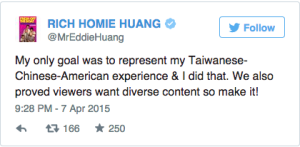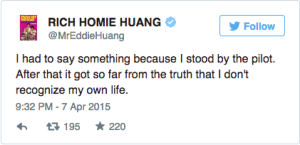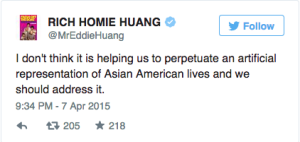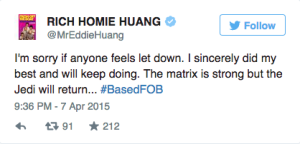Asian American stereotypes in mass media have heavily influenced viewers’ attitudes towards Asian Americans. Jun Xing speaks about the images that have pervasively pigeonholed Asian Americans in popular culture in his book Asian America Through the Lens. “As narrative conventions, they are noted for their incredible staying power and their wealth of sexist and racist clichés.” (Xing, 1998) The model minority stereotype is a common negative portrayal of Asian Americans. This stereotype was created in the 1960s showing Asian Americans as a polite and non-threatening group. It was crafted to promote Asian American assimilation as an exemplary archetype for other racial groups to follow. This adds to the deficiency of four-dimensional Asian American characters in mainstream television and movies and Asian Americans have begun a process of examining why they are misrepresented.
An Asian American family has not been featured in a television sitcom for twenty years. ABC picked up All American Girl starring Margret Cho, in 1995. (Jung, 2014)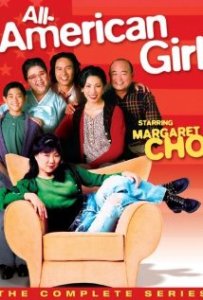 The show was about a Korean American “valley girl” torn between her family’s traditional values and the mall culture of nineties Southern California. The television show was written to cater more to the white audiences rather than a general audience. According to Jun Xing, the Asian American critics used the show as an example of flawed representation. Xing states, “Many Asian American viewers and critics though regarded the show as offensive and misleading, for it emphasized cultural conflict instead of racism as the major theme, and it reinforced the model minority image.”(Xing, 1998) Jon Caramanica of the New York Times interviewed Asian American critic Jeff Yang who wrote an extremely negative review back in the nineties. He stated, “The writing is awful, larded with stereotypes and dusty gags from ‘Full House’ ’s cutting-room floor.” (Caramanica, 2015) ABC decided to take it off the air after nineteen episodes because even the Asian community was not in favor of the sitcom.
The show was about a Korean American “valley girl” torn between her family’s traditional values and the mall culture of nineties Southern California. The television show was written to cater more to the white audiences rather than a general audience. According to Jun Xing, the Asian American critics used the show as an example of flawed representation. Xing states, “Many Asian American viewers and critics though regarded the show as offensive and misleading, for it emphasized cultural conflict instead of racism as the major theme, and it reinforced the model minority image.”(Xing, 1998) Jon Caramanica of the New York Times interviewed Asian American critic Jeff Yang who wrote an extremely negative review back in the nineties. He stated, “The writing is awful, larded with stereotypes and dusty gags from ‘Full House’ ’s cutting-room floor.” (Caramanica, 2015) ABC decided to take it off the air after nineteen episodes because even the Asian community was not in favor of the sitcom.
The different, yet controversial sitcom, Fresh off the Boat is based off of celebrity chef, Eddie Huang’s bestselling Memoir. The show is a comedy which follows twelve-year-old Eddie, growing up in the 1990s with his Taiwanese immigrant family who move to Orlando from Washington DC to chase the American dream. Fresh Off the Boat is one of first network sitcoms to star an Asian American family, and is the third attempt by any major network in the history of the medium to have one as the core in primetime programming. Even before the premiere of the first episode on February 2015, many were reluctant of the show, even Eddie Huang himself. Huang signed with ABC in hopes to alter perceptions about Asian Americans and portray an authentic Asian immigrant experience to America without ambiguousness. In his essay, “Bamboo-Ceiling TV”, he criticized the show’s development process and how the network “softened” his coming of age story. While turning his life into primetime television show, ABC watered down his experiences for white consumption. Huang states,
The only way they could even mention some of the stories in the book was by building a Trojan horse and feeding the pathogenic stereotypes that still define us to a lot of American cyclope. Randall was neutered, Constance was exoticized, and Young Eddie was urbanized so that the viewers got their mise-en-place. People watching these channels have never seen us, and the network’s approach to pacifying them is to say we’re all the same. (Huang, 2015)
Eddie Huang addresses the affects of harmful Asian American stereotypes and how they influence American views. The writers of the show had to incorporate a few stereotypes in order to appeal to a wider audience. (Deegan, 2015) The stereotypes do not represent or explore any complexities of a person’s identity. Along with the essay, Eddie Huang addresses his disappointment with the show’s poor portrayal of an Asian American life on his twitter.
Along with the stereotypes Eddie Huang mentioned in his essay, another is visible through the male character, Eddie. Hyper-masculinity is used to overcompensate the stereotype of the emasculate Asian male that is so often portrayed in mass media. Hyper-masculinity is harmful because it ends up becoming extremely misogynistic. It overcompensates the male’s sexuality and degrades the female. A clear example of the use of hyper masculinity is in the second episode, “Shimmy Shimmy Ya”. Eddie is trying to woo his neighbor or what he would like to call a “fine shorty” and the scene slips into Eddie’s fantasy of a rap music video cliché: money being thrown around and women used as props as twelve-year-old Eddie sprays Capri Sun on them.
Fresh Off the Boat has its flaws, but it does not hide from the fact that the show is a representation of growing up as a minority in a predominantly white world. It brings in a unique cultural perspective. In an interview with Asian Fortune News, the executive director of the Organization of Chinese Americans, Daphne Kwok states of the impact it has with Asian American Pacific Islanders (AAPIs), “In non-threatening environments and through unsuspecting channels, it is easier to inform others about who we, AAPIs, really are. I enjoyed the lessons depicted in the first four episodes: name-calling, mocking of different foods, inability to pronounce Asian names, etc. ”(Ilustre, 2015) Thanks to television companies like ABC for allowing diversity on a medium that rarely sees Asian faces, it can inform the public to be more accepting to different cultures. The actress that play Jessica Huang on Fresh Off the Boat, Constance Wu, addresses the topic of visibility and how the television show offers that.
I wouldn’t say that just visibility is important. I would say visibility as the stars of a show is important. That says that our stories matter. We’re not here to do the taxes of the white person, or to be the chipper best friend to the white person. It’s important to see Asians in those leading roles because it changes what I’m calling the anglo-heteronormative status of TV. (Feeney, 2015)
Fresh Off the Boat offers the opportunity to give a unique perspective because a white person is not the lead and the minority is not the butt of the joke. Wu adds by saying the show’s specificity is what makes it unique.
We shouldn’t be a voice for all Asians. We are such a varied group that there’s no one show that can be like, “This is what Asian America looks like!” But we’re given that burden because we’re so rarely represented. If you see Tina Fey on television, you’re not like, “All white women are like Tina Fey.” Yet people are like, “Oh, Jessica Huang’s not like my mother, but this show is supposed to be about Asians, so shouldn’t she be like my mother? (Feeney, 2015)
It is important to recognize that not every Asian American experience is alike. Eddie Huang also addresses the need for Asian Americans to be seen as whole people in an interview with Time. Huang addresses the categorizations that people are put in.
Bibliography:
Silman, E. (2015, April 8). Eddie Huang Blasts “Fresh off the Boat”: “An artificial representation of Asian American lives”. [Article] Salon. http://www.salon.com/2015/04/08/eddie_huang_blasts_fresh_off_the_boat_an_artificial_representation_of_asian_american_lives/
Eddie Huang [MrEddieHuang]. (n.d.) Tweets [Twitter page]. Retrieved April 8, 2015, from https://twitter.com/mreddiehuang
Ilustre, J. (2015, February 23). Asian Americans Say TV’s ‘Fresh off the Boat’ can fight Stereotypes, and it’s Funny,too. [Article] AsianFortuneNews.com. http://www.asianfortunenews.com/2015/02/asian-americans-say-tvs-fresh-off-the-boat-can-fight-stereotypes-and-its-funny-too/
Time Magazine. (2015, February 14). Eddie Huang: “Don’t tell me what needs to be offensive to me.” [Video File] https://www.youtube.com/watch?v=TDBzBsqkq3g
Viruet, P. (2015, February 11). Fresh Off the Boat Recap: Shimmy Shimmy Ya. [Article] Vulture. http://www.vulture.com/2015/02/fresh-off-the-boat-recap-episode-3-daytona-500-honey.html
Feeney, N. (2015, February 10). Fresh Off the Boat Star: “I Don’t Need to Represent Every Asian Mom Out Ever.” [Article] Time Magazine. http://time.com/3696111/fresh-off-the-boat-constance-wu/
ABC Television Network. (2015, February 9). Fresh Off The Boat- Eddie’s Fantasy. [Video File] https://www.youtube.com/watch?v=Bn8HiBCSRZI
Deggans, E. (2015, February 4). ABC Tones Down Author’s ‘Fresh Off The Boat’ for Sitcom Audience. [Article] NPR. http://www.npr.org/2015/02/04/383724495/abc-tones-down-authors-fresh-off-the-boat-for-sitcom-audience
Huang, E. (2015, February 4). Network TV Ate My Life: Eddie Huang on Watching His Memoir Become a Sitcom. [Article] Vulture. http://www.vulture.com/2015/01/eddie-huang-fresh-off-the-boat-abc.html
Caramanica, J. (2015, January 31). A Bloom in TV’s Asian-American Desert. [Article] New York Times. http://www.nytimes.com/2015/02/01/arts/television/fresh-off-the-boat-is-based-on-the-eddie-huang-memoir.html?rref=arts/television&module=Ribbon&version=origin®ion=Header&action=click&contentCollection=Television&pgtype=article
Yang, J. (2015, January 20). Is “Fresh off the Boat” a network sitcom or the rawest , realest TV show about Asian Americans ever? Yes. [Article] Quartz. http://qz.com/329384/is-fresh-off-the-boat-a-network-sitcom-or-the-rawest-realest-tv-show-about-asian-americans-ever-yes/
Jung, A.E. (2014, November 9). All-American Girl at 20: The Evolution of Asian Americans on TV. [Article] LAreviewofbooks.org. http://lareviewofbooks.org/essay/american-girl-20-evolution-asian-americans-tv/
Xing, J. (1998). Asian America through the lens: History, representations, and identity. Walnut Creek, CA: AltaMira Press.
